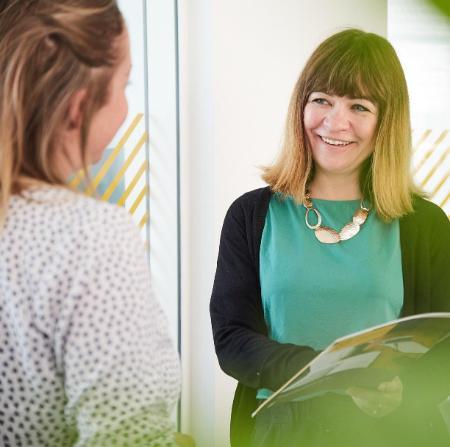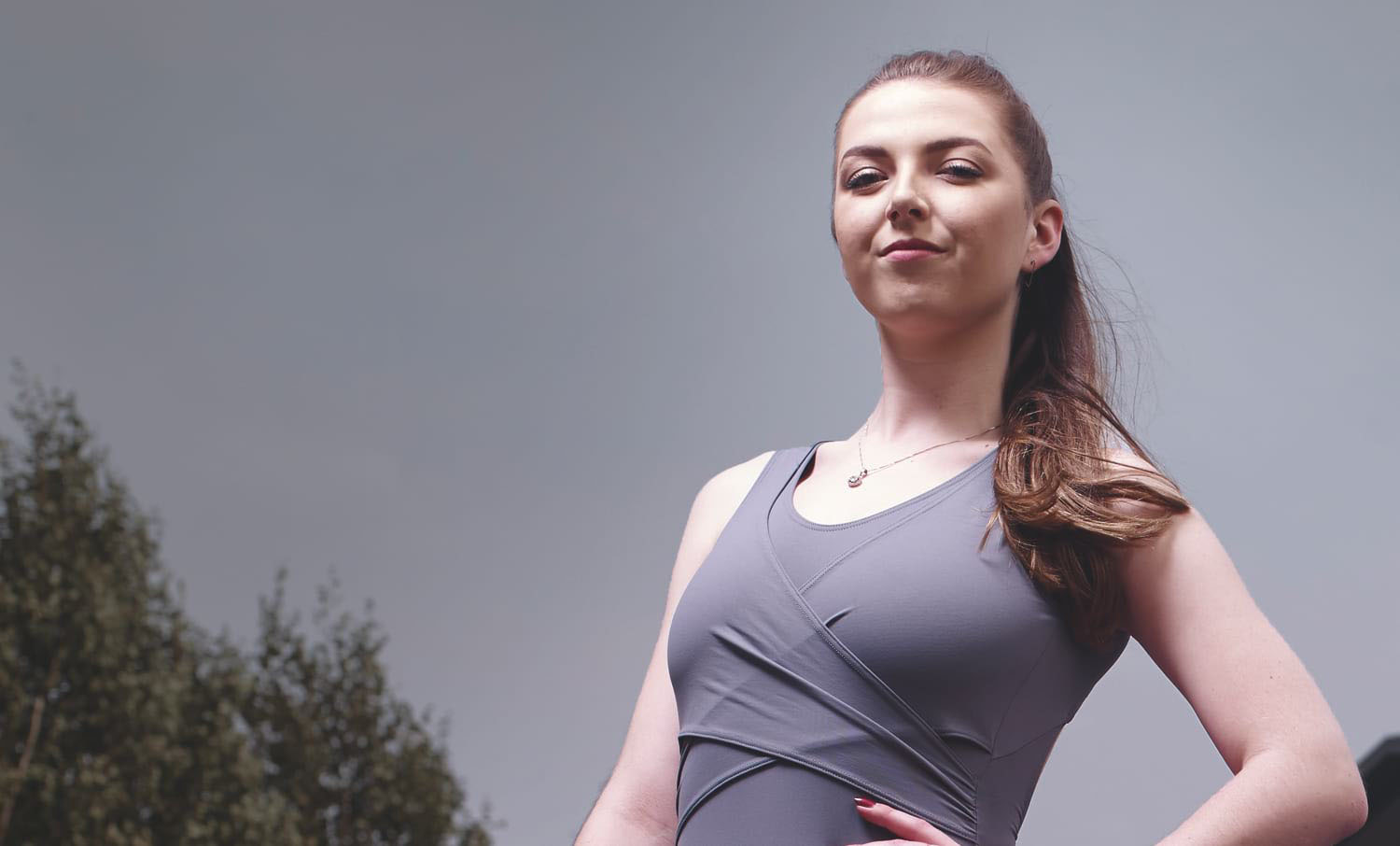Creative Writing and English Literature
QW38If you are a passionate reader who enjoys a broad spectrum of literature, from Shakespeare to Postmodern fiction, and you also like the idea of tapping into your own creative energies to craft poetry, plays or prose, then this is the perfect course for you.
Clearing
Unsure if you have the right grades? Make sure you talk to our friendly Admissions Team before ruling out any options. Visit our Clearing page to find out more.

Course overview
Our Creative Writing and English Literature degree offers an exploration of literary and creative writing in a rich combination of critical theory and practical workshops.
The Creative Writing modules enable you to enhance your skills and evolve as an individual writer at your own pace and in your own way, while discovering how your own writing relates to the wider realms of literary and cultural context.
In English Literature, study is wide-ranging as you investigate how literature works through a close reading of modern and traditional literature, cultural and critical analysis, and writing in different genres.
The course arms you with some fantastic transferable skills, such as confident and compelling storytelling, critical thinking and articulate expression. These abilities are valued in a variety of employment contexts including arts and entertainment as well as business and commerce.
Find out more about the Department of English and Creative Writing
What you need to know
Course start date
September
Location
Winchester campus
Course length
- 3 years full-time
- 6 years part-time
Apply
QW38
Typical offer
104-120 points
Fees
From £9,535 pa
Course features
- Join a community passionate about the study of creative writing, literature and the broad subject of English
- Study the craft of writing while discovering how your work relates to the wider realms of literary and cultural context
- Move progressively through a structured series of writing assignments and exercises, enhanced by a workshop environment
- Choose from an extensive range of optional Creative Writing and English Literature modules tailored to your interests and career aspirations
- Immerse yourself in an independent creative project in your final year
- Learn from course leaders who are published authors
Course details
The course seeks to move you progressively through a structured series of writing assignments and exercises, working on all genres of writing in the first year, and then allowing you to specialise in Years 2 and 3.
Your work develops in a workshop environment bolstered by positive critical encouragement and direction throughout. Additional guidance is given on audience (for example, editor, agent or publisher) where appropriate.
In Year 2, the focus becomes more specific with a choice of modules that concentrate on elements of different genres such as writing for children, media writing, poetry, song and play, film and TV script. English Literature modules involve studying a group of texts representative of a period of history, a particular genre or a particular area of the world.
In Year 3, the modules look increasingly at the relationships between writing and the world beyond the University, exploring publishing, producing, community audiences, writing and teaching. There is also an opportunity to work on an extended creative project in your chosen genre with one-to-one supervision from an expert in this field. Modules tend to be closely related to the research interests of teaching staff and engage with cutting-edge developments in the discipline.
Learning and teaching
Our aim is to shape 'confident learners' by enabling you to develop the skills needed to excel in your studies here and as well as onto further studies or the employment market.
You are taught primarily through a combination of lectures and seminars, allowing opportunities to discuss and develop your understanding of topics covered in lectures in smaller groups.
In addition to the formally scheduled contact time such as lectures and seminars etc.), you are encouraged to access academic support from staff within the course team and the wide range of services available to you within the University.
Independent learning
Over the duration of your course, you will be expected to develop independent and critical learning, progressively building confidence and expertise through independent and collaborative research, problem-solving and analysis with the support of staff. You take responsibility for your own learning and are encouraged to make use of the wide range of available learning resources available.
Overall workload
Your overall workload consists of class contact hours, independent learning and assessment activity.
While your actual contact hours may depend on the optional modules you select, the following information gives an indication of how much time you will need to allocate to different activities at each level of the course.
Year 1 (Level 4): Timetabled teaching and learning activity*
Teaching, learning and assessment: 288 hours
Independent learning: 912 hours
Year 2 (Level 5): Timetabled teaching and learning activity*
Teaching, learning and assessment: 288 hours
Independent learning: 912 hours
Year 3 (Level 6): Timetabled teaching and learning activity*
Teaching, learning and assessment: 236 hours
Independent learning: 964 hours
*Please note these are indicative hours for the course.
Teaching Hours
All class based teaching takes places between 9am – 6pm, Monday to Friday during term time. Wednesday afternoons are kept free from timetabled teaching for personal study time and for sports clubs and societies to train, meet and play matches. There may be some occasional learning opportunities (for example, an evening guest lecturer or performance) that take places outside of these hours for which you will be given forewarning.
Assessment
Our validated courses may adopt a range of means of assessing your learning. An indicative, and not necessarily comprehensive, list of assessment types you might encounter includes essays, portfolios, supervised independent work, presentations, written exams, or practical performances.
We ensure all students have an equal opportunity to achieve module learning outcomes. As such, where appropriate and necessary, students with recognised disabilities may have alternative assignments set that continue to test how successfully they have met the module's learning outcomes. Further details on assessment types used on the course you are interested in can be found on the course page, by attending an Open Day or Open Evening, or contacting our teaching staff.
The assessment balance between examination and coursework depends to some extent on the optional modules you choose. The approximate percentage of the course assessed by different assessment modes is as follows:
Year 1 (Level 4)*:
63% coursework
25% written exams
12% practical assessment
Year 2 (Level 5)*:
87% coursework
13% written exams
0% practical assessment
Year 3 (Level 6)*:
89% coursework
0% written exams
11% practical assessment
*Please note these are indicative percentages and modes for the programme.
Modules
Please note the modules listed are correct at the time of publishing. The University cannot guarantee the availability of all modules listed and modules may be subject to change. The University will notify applicants of any changes made to the core modules listed. For further information please refer to winchester.ac.uk/termsandconditions
Modules
More information coming soon.
More information coming soon.
This double module provides the foundation for the degree by establishing key skills for English Literature students. It focuses on four key areas:
- Developing a critical faculty through the study of various methodologies, for example: reading for political or ideological context; examining the terms ‘reader’, ‘author’ and ‘text’; exploring genre and hermeneutics; the controversy of the English ‘canon’.
- Advanced reading and handling of primary texts through the development of close-reading skills (e.g. quotation, critical commentary, etc.) which inform weekly blogs, effective and persuasive writing, etc.
- Building and consolidating research and academic skills (e.g. using libraries and journal databases; handling scholarly materials and referencing accurately to develop and substantiate good academic practice).
- Reflection on the UN Sustainability Development Goals.
More information coming soon.
Modules
More information coming soon.
More information coming soon.
More information coming soon.
In term one, students can choose from:
- Global Gothic - 15 Credits
- Children's Literature and Young Adult Fiction - 15 Credits
In term two, student can choose from:
- Literature and the Body - 15 Credits
- Victorian Literature - 15 Credits
Modules
In this module you will have the opportunity to plan and produce a substantial creative piece which could take the form of prose, poetry or creative nonfiction with a word count of 5,000 words (Note the word count for poetry would be negotiated). This would be supported by a supporting rationale also of 5,000 words that demonstrates a substantial engagement with a particular critical issue that is relevant to the creative piece. A supporting bibliography is also required. This module is primarily student-directed. You will be allocated two supervisors: one for the creative element and one for the critical. You will be supported by the allocated supervisors who you can meet with to discuss your project and progress.
More information coming soon.
Across both terms, students can choose from:
- Fantasy and Science Fictions - 30 Credits
- Literature and Film - 30 Credits
In term one, students can choose from:
- Globalisation and Contemporary Fiction - 15 Credits
- Creative Teaching for Creative Writing - 15 Credits
In term two, students can choose from:
- Women's' Writing in the Long Eighteenth Century - 15 Credits
- Writing for Games - 15 Credits
Entry requirements
In addition to tariff points an A level or equivalent level 3 pass in English, or in a related subject in the areas of arts, humanities or social sciences, including drama, theatre, communications, history, theology or philosophy.
Our offers are typically made using UCAS tariff points to allow you to include a range of level 3 qualifications and as a guide, the requirements for this course are equivalent to:
A-Levels: BCC-BBB from 3 A Levels or equivalent grade combinations (e.g. BBB is comparable to ABC in terms of tariff points)
BTEC/CTEC: DMM from BTEC or Cambridge Technical (CTEC) qualifications
International Baccalaureate: To include a minimum of 2 Higher Level certificates at grade H4 or above, including a pass in English, or in a related subject in the areas of arts, humanities or social sciences, including drama, theatre, communications, history, theology or philosophy.
T Level: Merit in a T Level
Additionally, we accept tariff points achieved for many other qualifications, such as the Access to Higher Education Diploma, Scottish Highers, UAL Diploma/Extended Diploma and WJEC Applied Certificate/Diploma, to name a few. We also accept tariff points from smaller level 3 qualifications, up to a maximum of 32, from qualifications like the Extended Project (EP/EPQ), music or dance qualifications. To find out more about UCAS tariff points, including what your qualifications are worth, please visit UCAS.
In addition to level 3 study, the following GCSE’s are required:
GCSE English Language at grade 4 or C, or higher. Functional Skills at level 2 is accepted as an alternative, however Key Skills qualifications are not. If you hold another qualification, please get in touch and we will advise further.
If you will be over the age of 21 years of age at the beginning of your undergraduate study, you will be considered as a mature student. This means our offer may be different and any work or life experiences you have will be considered together with any qualifications you hold. UCAS have further information about studying as a mature student on their website which may be of interest.
If English is not your first language, a formal English language test will most likely be required and you will need to achieve the following:
- IELTS Academic at 6.0 overall with a minimum of 5.5 in all four components (for year 1 entry)
- We also accept other English language qualifications, such as IELTS Indicator, Oxford ELLT, Pearson PTE Academic, Cambridge C1 Advanced and TOEFL iBT.
If you are living outside of the UK or Europe, you can find out more about how to join this course by contacting our International Recruitment Team via our International Apply Pages.
2025/6 Course Tuition Fees
| UK / Channel Islands / Isle of Man / Republic of Ireland |
International |
|
|---|---|---|
| Year 1* | £9,535 | £16,700 |
Additional tuition fee information
*(UK / Channel Islands / Isle of Man / Republic of Ireland) £9,535 for the 25/26 academic year. Fees for future academic years will be determined in line with our Terms and Conditions. The fee is currently subject to a governmental fee cap for each academic year. It is our policy to charge tuition fees at the level of the cap set by the Government. If the cap set by the Government changes, then we may increase our Fees in line with governmental policy.
*(International) £16,700 for the 25/26 academic year. Fees for future academic years will be determined in line with our Terms and Conditions. We decide the annual level of increase of our Tuition Fees by taking into account a range of factors including the cost of delivering the course and change in governmental funding.
Remember, you don’t have to pay any of this upfront if you are able to get a tuition fee loan from the UK Government to cover the full cost of your fees each year.
UK Part-Time fees are calculated on a pro rata basis of the full-time fee for a 120 credit course. The fee for a single credit is £79.45 and a 15 credit module is £1,191. Part-time students can take up to a maximum 90 credits per year, so the maximum fee in a given year will be the government permitted maximum fee of £7,145
International part-time fees are calculated on a pro rata basis of the full-time fee for a 120 credit course. The fee for a single credit is £139.14 and a 15 credit module is £2,087.
Additional costs
As one of our students all of your teaching and assessments are included in your tuition fees, including, lectures/guest lectures and tutorials, seminars, laboratory sessions and specialist teaching facilities. You will also have access to a wide range of student support and IT services.
There might be additional costs you may encounter whilst studying. The following highlights the mandatory and optional costs for this course:
Optional
Core Texts
Copies of core texts are held within the library and e-books are identified where possible, however often students wish to purchase some books for their own use. It is possible for students to buy second-hand copies. Indicative cost is £160 per academic year.
Field Trip
In students second year of study, there may be a field trip depending on module choices. Indicative cost is £20.
Disclosure and Barring Service
A Disclosure and Barring Service (DBS) clearance check may be required if you undertake a placement, volunteering, research or other course related activity where you will have contact with children or vulnerable adults. The requirement for a DBS check will be confirmed by staff as part of the process to approve your placement, research or other activity. The indicative cost is £40.
SCHOLARSHIPS, BURSARIES AND AWARDS
We have a variety of scholarship and bursaries available to support you financially with the cost of your course. To see if you’re eligible, please see our Scholarships and Awards.
CAREER PROSPECTS
Graduates become professional writers or follow careers in publishing, advertising, marketing, teaching or other professions that require advanced communication skills. Recent graduates have successfully set themselves up as freelance writers.
The University of Winchester ranks in the top 10 in the UK for graduates in employment or further study according to the Graduate Outcomes Survey 2023, HESA.
Pre-approved for a Masters
If you study a Bachelor Honours degree with us, you will be pre-approved to start a Masters degree at Winchester. To be eligible, you will need to apply by the end of March in the final year of your degree and meet the entry requirements of your chosen Masters degree.
OUR CAREERS SERVICE

I love the freedom you get, you can basically do whatever you want to do. You can be really expressive and creative. You get a lot of help through workshopping and it gives you a chance to read different forms of writing that I never thought existed.

